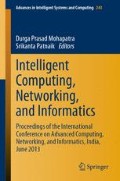Abstract
Understandability is one of the important characteristics of software quality, because it may influence the maintainability of the software. Cost and reuse of the software is also affected by understandability. In order to maintain the software, the programmers need to properly understand the source code. The understandability of the source code depends upon the psychological complexity of the software, and it requires cognitive abilities to understand the source code. The understandability of source code is getting affected by so many factors. In this paper, we have taken different factors in an integrated view. We have chosen rough set approach to calculate the understandability based on outlier detection. Generally, the outlier is having an abnormal behavior. Here, we have taken that outlier may be easily understandable or difficult to understand. Here, we have taken a few factors, which affect understandability, and bring forward an integrated view to determine understandability.
Access this chapter
Tax calculation will be finalised at checkout
Purchases are for personal use only
References
Halstead, M.H.: Elements of Software Science. Elsevier, Amsterdam (1977). ISBN 0-444-00205-7
Krishan, K., Aggarwal, Y.S.: An integrated measure of software maintainability. In: Proceedings of Annual Reliability and Maintainability Symposium, pp. 235–240. (2002)
Li, X., Rao, F.: An rough entropy based approach to outlier detection. J. Comput. Inf. Syst. 8(24), 10501–10508 (2012)
Mall, R.: Fundamentals of Software Engineering, 3rd edn. Prentice Hall, New York (2009)
Singh, J.K.: Code and data spatial complexity: two important software understandability measures. Inf. Softw. Technol. 45(8), 539–546 (2003)
Singh, J.K.: Measurement of object-oriented software spatial complexity. Inf. Softw. Technol. 46(10), 689–699 (2004)
Lin, J.-C., Wu, K.-C.: A model for measuring software understandability. In: Proceedings of the Sixth IEEE International Conference on Computer and Information Technology, 2006. CIT’06, pp. 192–192. (2006)
Lin, J.-C., Wu, K.-C.: Evaluation of software understandability based on fuzzy matrix. In: Proceedings of the IEEE International Conference on Fuzzy Systems, 2008. FUZZ-IEEE 2008, (IEEE World Congress on Computational Intelligence), pp. 887–892. (2008)
Author information
Authors and Affiliations
Corresponding author
Editor information
Editors and Affiliations
Rights and permissions
Copyright information
© 2014 Springer India
About this paper
Cite this paper
Srinivasulu, D., Sridhar, A., Mohapatra, D.P. (2014). Evaluation of Software Understandability Using Rough Sets. In: Mohapatra, D.P., Patnaik, S. (eds) Intelligent Computing, Networking, and Informatics. Advances in Intelligent Systems and Computing, vol 243. Springer, New Delhi. https://doi.org/10.1007/978-81-322-1665-0_95
Download citation
DOI: https://doi.org/10.1007/978-81-322-1665-0_95
Publisher Name: Springer, New Delhi
Print ISBN: 978-81-322-1664-3
Online ISBN: 978-81-322-1665-0
eBook Packages: EngineeringEngineering (R0)

